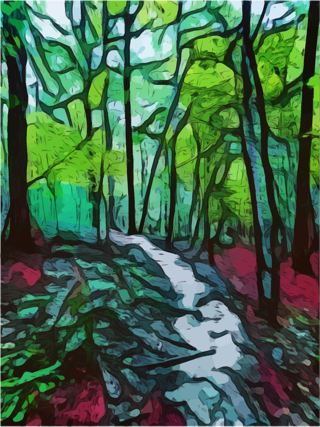Environment
Want to Extend Your Shelf Life as a Cop? Take a Hike.
Spending time in nature is the way to learn perspective, pacing, and humility.
Posted November 19, 2020

I am writing this after a trip to Yosemite National Park. Since the pandemic began, I've been longing, not just for a change of scenery, but for a trip to the mountains. Wilderness camping has been a meaningful part of my life. It’s been years since I strapped on a backpack, slept on the ground, and squatted in the woods, but the minute I breathed in that mountain air, the joys and lessons of being in nature came rushing back.
I’ve always said that walking in the high country is a metaphor for life: Moments of absolute ecstasy and awe alternate with stretches of frustration, fear, hopelessness, and head-down persistence. Like a police career, it is a trip that is best taken slowly with a lot of care.
Research in a developing field of science called ecotherapy has shown a strong connection between time spent in nature and reduced stress, anxiety, and depression. Some claim the benefits are equal to taking medication. Calming sounds, pleasant sights, and panoramic views apparently lower blood pressure, reduce levels of the stress hormone cortisol, and soothe a part of the brain that is active during rumination, that endless repetitive loop of negative thoughts and feelings.
Policework is full of negativity. Cops see more tragedy in the first few years of work than most people see in a lifetime. Not to mention the negativity that comes from working in a bureaucracy or trying to do your job in the midst of a pandemic and a groundswell of anti-police rhetoric. Putting something positive back into life is a perpetual challenge for most cops. Fighting against depression and anxiety by doing something as simple as being in nature, for many people, has equal benefits and fewer side effects than taking medication.
Why is this? There may be many reasons. To begin with, it’s a relief to focus on one thing at a time, to move slowly and be fully awake to one’s surroundings. I’m not talking about hypervigilance, scanning the environment for lethal threats. Most cops are too good at this. I’m talking about being mindful and appreciative, not wary. I’m talking about noticing how time slows down when it is filled with the present.
Granted, it can be a challenge to get your head in the place where your feet will slow down. Especially for fast-reacting, Type-A folks, like so many LEOs (law enforcement officers). But learning to move slowly—taking a breath with every step and a step with every breath—helps a person keep going for a long time. Once, as I was dragging myself up a steep incline, I met a group of older men who had stopped to rest at a particularly dramatic overlook. They dropped their heavy backpacks lashed with tents and fishing gear. We talked about trail conditions and speculated about the weather. “Aren’t the wildflowers beautiful this year?” I asked. “Yes,” said one of the group, “But they were even more beautiful two weeks ago!”
Back in the day when I was wilderness camping, I went with a group of friends who had been backpacking together since they were college students. Most of them were now grandparents. Our trips were strenuous and we recognized that we needed help. So, we hired a horse packer to haul a caravan of excessive creature comforts to our campsite: chairs, tables, sun-showers, a cell phone for emergencies, hi-tech camp stoves, a portable gazebo, and mountains of food for a week of spirited cook-offs. We joked that we had to hire three extra horses; one to carry the white wine, one for the red, and one for the beer.
Our indulgence was less compensation for the limitations of age than it was the determination to carry on in spite of them. We adapted so that we could keep on doing what we loved despite hip replacements, bad backs, prostate cancer, high blood pressure, thyroid problems, pot bellies, and a rash of irritating infirmities. All of which pale in the alpenglow of those huge granite mountains. Being in nature, it becomes clear that the human life span is only one of a variety of earthly tenures ranging from decades to days. Around me were Sierra Junipers that have stood since Abraham Lincoln was President and butterflies that will not last from sunrise to sunset. There is nothing like an unexpected snowstorm, a sky full of stars, or a dozen varieties of wildflowers clustered on a tiny outcropping of moss in a gin-clear stream, to put the soap opera of one’s life into perspective.
Wilderness camping is a chance to reconnect to what is basic about life; food, shelter, safety, companionship, and the humility that comes with reverence for something bigger than ourselves. It expands the narrow negative slice of life that is a police officer’s territory.
A police career is like a long walk in the mountains. When you’re starting out, you can sprint up a hill. But if you want to complete a long journey and arrive home uninjured, you’ll need to acknowledge your limitations, learn how and when to ask for help, and accept it when it’s given.
I’m lucky to live where I do. I can be at the ocean in 30 minutes, the mountains in four hours. I realize that not everybody can travel, especially in the midst of a pandemic. If you can’t get to the mountains, bring the wild home. Play nature sounds on your devices, watch movies and documentaries about the outdoors. Go to a local park. Sit out in your backyard. You’ll still get the benefits.
References
Gregory N. Bratman, J. Paul Hamilton, Kevin S. Hahn, Gretchen C. Daily, and James J. Gross (2015). Nature Experience Reduces Rumination and Subgenual Prefrontal Cortex Activation. Proceedings of the Nation Academy of Sciences. Retrieved from https://doi.org/10.1073/pnas.1510459112.
Harvard Men's Health Watch: Sour Mood Getting You Down? Get Back to Nature. Retrieved from https://www.health.harvard.edu/mind-and-mood/sour-mood-getting-you-down-get-back-to-nature.


